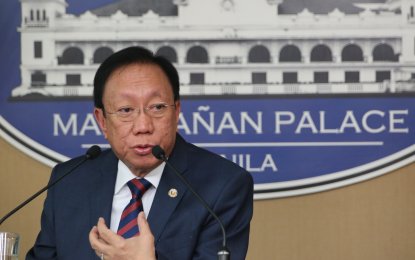News
SolGen defends suspension of Deputy Ombudsman Carandang

FILE: Solicitor General Jose C. Calida said the President had the authority to discipline a Deputy Ombudsman. (PNA Photo)
MANILA — The Office of the Solicitor General (OSG) on Tuesday defended the decision of the Office of the President to put under a 90-day preventive suspension and charge Overall Deputy Ombudsman Melchor Carandang.
Solicitor General Jose C. Calida said the President had the authority to discipline a Deputy Ombudsman.
“The Constitution is clear that only the Ombudsman is subject to impeachment proceedings. While silent as to the disciplinary authority over a Deputy Ombudsman, the subsequent enactment of the Ombudsman Act filled this gap and expressly granted the authority to the President,” Calida said in a statement.
The Solicitor General further stressed that the President had the inherent power to discipline a Deputy Ombudsman, being the appointing authority.
“The Supreme Court has held that the power to discipline is lodged in the same authority in whom the power to appoint is vested,” Calida opined.
Citing Justice Antonio Carpio’s opinion, Calida said that the independence of the Office of the Ombudsman was not the same as the independence provided to other governmental bodies, such as the Judiciary.
Calida also said Carandang was free to seek legal remedy in any court, noting that he was ready to defend the Office of the President.
“Deputy Ombudsman Carandang is free to seek redress before the competent court. Nonetheless, my office is ready to defend the action of the Office of the President in suspending Carandang. We are confident that the Supreme Court will reverse its 2014 ruling,” Calida explained.
In 2014, the High Court declared as unconstitutional Section 8(2) of the Ombudsman Act of 1989, which grants the president the power to remove a Deputy Ombudsman, by a vote of eight against seven (8-7).
An earlier ruling in 2012 ruled for the constitutionality of the assailed provision on an even vote of seven to seven (7-7), leading to the dismissal of the petition.
On Monday, Presidential Spokesperson Harry Roque said the Office of the Executive Secretary (OES) has formally charged Carandang for “grave misconduct and grave dishonesty for misuse of confidential information and disclosing false information” on the alleged bank transactions of President Rodrigo Duterte and his family.
Roque said Carandang had violated Section 3A of Republic 3019 “causing any undue injury to any party, including government, or giving any private party any unwarranted benefits, advantage of preference in the discharge of his official administrative or judicial function through manifest partiality, evident bad faith or gross inexcusable negligence.”
Carandang has also violated Section 3K of RA 3019 in relation to Section 2, Rule 5 of the Office of the Ombudsman, Administrative Order No. 7 for divulging valuable information of confidential character acquired by his office or by him on account of his official position.
Pursuant to the formal complaint filed by lawyers Manolito R. Luna and Elijo P. Mallari, Roque said the OES had placed Carandang under preventive suspension for a period of 90 days “effective immediately”.
Carandang, who was tasked to investigate the alleged bank transactions of the First Family, confirmed to the media in September 2017 that the Ombudsman had received information on the alleged bank transactions through the Anti-Money Laundering Council (AMLC).
When asked if the President had the authority to impose sanctions on officials of the Office of the Ombudsman, Roque only said the Ombudsman is impeachable.
“The deputies are not. They are subject to the disciplinary powers of the Chief Executive and this has been decided in the Gonzales case. That’s the law,” Roque explained.
The OES, he said, had found probable cause to charge Carandang, who had 10 days to answer the charges.





















